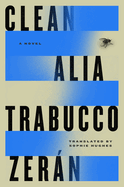
Clean, by International Booker Prize finalist Alia Trabucco Zerán, opens as the narrator introduces herself: "My name is Estela. Can you hear me?" The context of Estela's situation is unclear at first, but readers soon understand that she is alone in a room with a two-way mirror, offering some kind of testimony or confession. She isn't being interrogated, but the entirety of the novel, rendered in a taut translation from the Spanish by Sophie Hughes, could be seen as Estela's answer to the question: What happened to "the girl"?
Estela works as a maid for the Jensen family in Santiago, Chile, hired one week before their only daughter, Julia, is born. It is Julia who has died, a fact revealed from the start--"The girl dies. Did you hear this time? The girl dies and she's still dead, no matter where I begin." Estela's voice is sharp and incisive, offering commentary on her role in the house and on each member of the family, whom she describes as "an unhappy little girl, a woman keeping up appearances and a man keeping count: of every minute, every peso, every conquest." There is an eerie calm in her telling, which is full of tension and the certainty of her story's tragic end and undercut by a pacing that feels at once urgent and detached. Trabucco Zerán probes issues of power and class, and by the novel's conclusion, readers must consider the broader forces at play, the ones that ask: Who gets to tell the stories and who is actually listening? Readers will swallow Clean in one breathless gulp and then ruminate on it for days. --Sara Beth West, freelance reviewer and librarian

